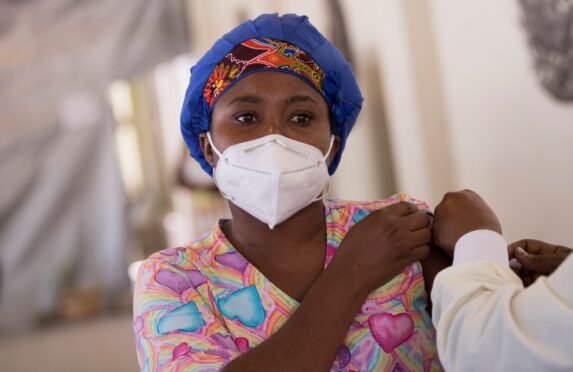
The gulf between vaccination rates in the world’s poorest and richest countries is widening and risks encouraging new and dangerous Covid variants, experts fear.
Some of the world’s poorest countries still have vaccination rates of less than 1% while some of the richest, including Scotland, have rates well over 80%.
Meanwhile, four fifths of vaccines delivered worldwide have gone to people in wealthy countries while less than 1% of doses have gone to low-income countries.
Congo, Haiti, Turkmenistan, Tanzania, South Sudan, Chad and Madagascar have the lowest uptake.
Poorer nations are relying on a vaccine-sharing system called Covax, which originally planned to provide two billion doses by the end of 2021. However, production problems and vaccine hoarding by wealthy nations are hampering efforts and the latest Covax projection is for 1.4 billion doses to be made available.
Scientists fear low distribution levels will lead to the emergence of a more dangerous variant of Covid.
The UK Government’s Scientific Advisory Group for Emergencies warned in August that the emergence of a new variant that evaded current vaccines was almost certain to happen.
Public health professor Linda Bauld, of Edinburgh University, said: “There are a lot of geopolitical issues that have come into this but clearly the public health message is unless we can deliver more vaccines overseas, we will not be able to live our lives normally because the risk of people coming into the country with new variants is substantial.
“It really does need to be something that’s sorted out and I think Cop26 is an opportunity for many global leaders to be together and I would hope vaccine equity is something that will also be discussed, alongside climate change.
“Donations are really important but the other thing the UK and other wealthy countries need to do is support developing countries to manufacture their own vaccines. The science is there, it can be done. The countries need infrastructure.”
The continent with the lowest percentage of populations vaccinated is Africa, with just 6.8 % having received at least one dose of a vaccine. High-income countries have administered 61 times more doses per head than low-income countries.
In Scotland, 92% of people aged 18 and over have received their first dose and 86% have received their second.
Former UK prime minister Gordon Brown, who was recently appointed as the World Health Organisation’s ambassador for global health financing, has said more must be done to distribute vaccine to developing nations.
He said: “Covid-19 cannot be contained unless we vaccinate the whole world to prevent the disease from mutating and coming back to haunt us all, including the vaccinated.”
He criticised wealthy nations for hoarding so many vaccines that 100 million doses were likely to pass their use-by date by December.
However, wealthy countries continue to press ahead with delivering a third dose to millions of people amid fears immunity from the first two doses could be waning.
Public health professor Allyson Pollock, of Newcastle University, said: “We’re wasting a lot of vaccines in this country on people who have already had Covid and have natural immunity.
“I am pro-vaccination – I am a public health doctor – but we really have quite a bit of uncertainty about the booster rollout.
“A number of scientists are questioning the decision to roll out boosters without good data and when so many people have already had the disease.”
Scottish Health Secretary Humza Yousaf said: “As we move towards the autumn and winter months, it is vital we build on our achievements to continue delivering Covid-19 vaccinations, including third doses and boosters to those eligible.”

Enjoy the convenience of having The Sunday Post delivered as a digital ePaper straight to your smartphone, tablet or computer.
Subscribe for only £5.49 a month and enjoy all the benefits of the printed paper as a digital replica.
Subscribe